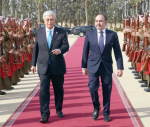You are here
In response to war in Ukraine, Germany boosts military strength
Mar 02,2022 - Last updated at Mar 02,2022
When Olaf Scholz stepped before the German parliament, the Bundestag, on February 27, he made announcements that shook the house and took many by surprise. Not only was Germany going to break with the long tradition not to export weapons to conflict zones by directly arming Ukraine. Scholz undertook a U-turn that would have been unthinkable just a week prior: Germany is to seriously boost its military strength. Not only did he promise an investment of 112 billion US dollars to get the country's armed forces back in shape, he also vowed to meet Nato's military spending target of 2 per cent of its GDP. And even surpass it.
Scholz's bold move highlights another of Germany's drastic changes in its foreign policy over the decades following World War II. When in the 1950s, West Germany, in ruins after the defeat of Nazi Germany in World War II and its reputation tarnished across the world, began its rearmament supported by Western allies to serve as a bulwark against communism, Scholz's party, the Social Democratic SPD, opposed it. Never again was Germany going to be the point of origin for any military conflict in the world. Although coming to terms with the mere existence of their defensive military forces, the Bundeswehr, pacifist policy remained sacred to the SPD. When in 1979, Germany's then Social Democratic chancellor Helmut Schmidt (1918-2015) agreed to the Nato Double-Track Decision and the deployment of medium-range ballistic missiles in West Germany, his party turned on him. During the Kosovo War in 1999, the then chancellor Gerhard Schröder broke a long tradition by sending German soldiers into combat for the first time after World War II. Although not meeting the same fate as Helmut Schmidt, some in his party took offence.
The decades that followed the fall of the Berlin Wall in 1989 and Germany's reunification in 1990 were marked by disarmament. With the Warsaw Pact gone and no apparent threat of another great war, Germany's military was neglected. It has since suffered severe blows. Despite being the world's fourth-largest arms-exporter Germany's armed forces do not reflect the quality of the country's military products. State-of-the-art military equipment "Made in Germany", highly desired across the world and acquired by its partners can hardly be seen inside their own military. Bearing the brunt of a seemingly indestructible bureaucracy and suffering the lack of personnel, Germany's men and women in uniform often have to rely on obsolete equipment that is sometimes not even operational. Shortly after Russian troops invaded Ukraine, lieutenant general Alfons Mais, the Inspector of the Army and thus its highest-ranking officer, gave vent to his anger. In a LinkedIn post, he called the Bundeswehr's options to support Nato "extremely limited", saying that it is "basically bare". His concerns are shared by many. Numerous experts consider Germany's military practically incapable of defending the country in the current stage.
Mais' concern is hardly a domestic one. Nato allies are irritated by the outworn military of an ally well-known for its economic might. When Donald Trump became president in 2017, he boisterously reiterated an old claim long stated by many previous administrations in the White House: That all members of Nato should spend at least 2 per cent of their GDP on their military. Scholz's predecessor Angela Merkel reluctantly agreed to meet that goal over the coming years. Her decision was not met with joy by many. In Scholz's party SPD, although Merkel's coalition partner at the time, many opposed reforms that would have made the military more operational knowing that the majority of the populace would reject anything that might give the mere idea of ostensibly new-born militarism.
As of late, no longer. The war in Ukraine has driven fear into people's hearts and revived memories among the dwindling number of Germans who are old enough to have witnessed the ugly truth of war first-hand. All of a sudden, reservations against rearmament seem to have dropped. The awareness of the necessity for a sovereign country to defend itself is no longer taboo.
Yet, the majority of those now cheering Scholz's new policy may not have realised what it will automatically entail: With the fourth-largest GDP in the world Germany's military would not just be operational again. If the goal of 2 per cent of GDP is met its military budget, currently at 1.5 per cent, would soar to over 70 billion dollars annually making it the third-largest in the world and the largest in Europe. Albeit no nuclear-weapon state, Germany would thus be one of the dominating military powers. The consequences are unforeseeable as of yet. With the largest military budget in Europe, it could turn out a lot more difficult for Germany not to participate in joint military missions with their partners. Germany's neighbours, although cheerful now, might be estranged in the future. With the vivid memory of World War II and Nazi Germany's Wehrmacht subduing large parts of Europe the newly arisen German military might bring back long-forgotten worries. No matter how unsubstantiated. Either way, one thing is certain already: The war in Ukraine has changed the whole of Europe.
The writer is a German journalist, political analyst and commentator.












